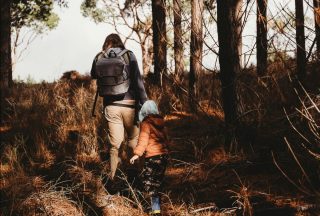Losing someone close to you can be devastating. If you have been looking after that person, the loss can feel even harder and change a huge part of your life.
There is no right or wrong way to grieve, and death can be a very different experience for each person. But it’s important to remember you are not alone, and to seek help and reach out if you need it.
Dealing with grief and emotions
There are no set rules to grief and it is not linear. How you might feel is different for everyone and might change day to day, hour to hour. The most important thing to remember is to let yourself feel and grieve the way you want, not as you think you should.
Grief may not even happen straight away. Immediately after a death you may find yourself busy and distracted with the many practical things you have to do. It may only be once all the practicalities are dealt with, and people around you get back to their everyday lives, you find that you begin to grieve.
As a carer, the loss of a loved one may bring different emotions because of the loss of your caring role. Looking after the person who has died might have been something you had been doing for a very long time, and so suddenly being without that role may be hard and strange.
Remember that it is okay to feel a sense of relief, to feel anger or guilt. You may also feel exhausted and alone, as many carers build up relationships with health professionals because of the person they care for, and it can be hard when these relationships come to an end. Whatever you feel, it is okay to feel. There is not one typical response to loss.
The physical effects of loss
Although grieving is different for everyone, we tend to expect losing someone to have an effect on our emotions and mood, but we forget how it can affect us physically as well. After you lose your loved one, you may feel tired and fatigued, have aching muscles or feel a tightness in your joints, have stomach problems or feel nauseous, be unable to sleep or find you are sleeping a lot, and more.
However you’re feeling, it’s important to tune in to your physical symptoms and be kind to yourself. You may find placing lavender under your pillow helps you to sleep, taking a few moments to do some stretching or yoga helps your muscles, or making sure you’re eating healthy meals or snacks gives your body the nourishment it needs.
Remember to book an appointment with your GP and let them know what you are experiencing, both physically and mentally.
Finding help
Often we seek help in those around us, those who know us best. You may find at this time, even those close to you may seem different or ‘awkward’, unsure how to talk to you or what to say. It can be hard for people to know what the ‘right thing’ to say is during times of loss, but if you can reach out to those close to you and let them know what you need, that will help them to comfort you. You may want to talk about your loved one, and reminisce with memories. You may want to talk about their death, or you may not want to talk about them at all. Just talking with someone can be a great source of comfort.
Bereavement Help Points
Carer Support Wiltshire run a number of bereavement help point drop-ins, in partnership with Dorothy House Hospice.
These are regular groups that are free to attend and open to all members of the community who have been bereaved. They offer a safe, welcoming space and there is no pressure to speak or take part in anything you’d prefer not to.
View the locations, dates and times of all bereavement help points here – carersupportwiltshire.co.uk/whats-on/?event-cat=512&location=all
Talk to others
- You can also call us on 0800 181 4118 for advice, information or a friendly voice to talk to.
- Cruse Bereavement Care (https://www.cruse.org.uk/about/contact-us/) offer free face to face sessions, group sessions and telephone support. They also have some great information and resources on bereavement.
- Talk to your GP about counselling, or find private counselling (https://www.bacp.co.uk/) in your area.
- Dorothy House (https://www.dorothyhouse.org.uk/) also offer bereavement support through a number of ways and has resources on loss and grieving.
- Carers UK (https://www.carersuk.org/get-involved/join-us/our-forum/) has a forum for carers, with a specific section for those bereaved and no longer caring.
- Macmillan (https://community.macmillan.org.uk/cancer_experiences/bereaved-spouses-and-partners-forum) can support those who have lost a loved one through cancer, and they also have a forum for those dealing with loss.
- Help is at hand (https://supportaftersuicide.org.uk/resource/help-is-at-hand/) is a resource for people bereaved through suicide or other unexplained death, and for those helping them.
- If you have a child that is struggling with loss Wiltshire Treehouse is a children’s bereavement service that is currently offering a new bereavement project for school children ages 6 – 11, which will run from the Trowbridge area 3 times a year. The programme is open to all Wiltshire children in this age group. By using creative activities young people will be able to express their grief and explore coping strategies, as well as connecting with others who are bereaved. For more details visit https://www.wiltshiretreehouse.org.uk/uploaded_files/1083/images/NEST%20leaflet%20Wilts%20V1.pdf. To book onto this programme for your child please visit www.wiltshiretreehouse.org.uk and fill out the WILTSHIRE TREEHOUSE REFERRAL FORM on the home page.
Mental health support
It’s important to reach out for support if you’re feeling low. Remember to talk to your GP about how you’re feeling. Even though grieving is normal after the loss of a loved one, you don’t have to suffer in silence.
- You can call Samaritans (https://www.samaritans.org/) at any time free of charge on 116 123 to talk to someone about how you’re feeling. You can also email them for a 24 hour response.
- The Silver Line (https://www.thesilverline.org.uk/) is a free helpline for people 55+ available 24 hours, 365 days a year.
- Cruse Bereavement Care (https://www.cruse.org.uk/) has a helpline if you want to talk about how you are feeling, or get practical advice.
- Read our resource page (https://carersupportwiltshire.co.uk/information-hub/mental-health/) for more mental health information that can help you at this time.
- Dealing with addiction or mental health issues after a bereavement can be incredibly tough. But remember, you are not alone. Rehab4Addiction is here to offer a helping hand. This UK-based addiction helpline provides a wealth of resources and information. If you or someone you know could benefit from Rehab4Addiction’s services, please visit their website at https://www.rehab4addiction.co.uk/.
Remember you are not alone. We are here for you.
Call us on 0800 181 4118 (Monday – Thursday 9:30 – 4:30, Fridays 9:30 – 4:00) or email us at admin@carersupportwiltshire.co.uk




